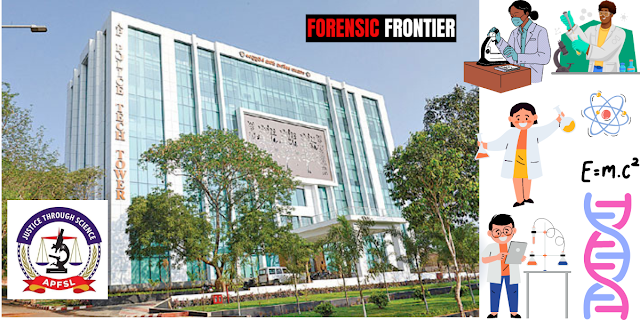The Structure of a Forensic Science Laboratory
Introduction
Forensic Science Laboratories (FSLs) play a crucial role in modern criminal investigations, providing invaluable scientific analysis and evidence examination. Today I want to explain about the Structure of a Forensic Science Laboratory by taking an example of a Forensic science lab in Andhra Pradesh. In Andhra Pradesh, the government established a state-of-the-art FSL in 1974. Today, it stands as a full-fledged institution, aiding law enforcement agencies in solving complex cases. Let's delve into the organizational structure of this fascinating world of forensic investigations.
The Director and Joint Directors: At the helm of the FSL is the Director, who reports directly to the esteemed Director General of Police. Assisting the Director are four Joint Directors, each heading specific divisions - Chemical, Biological, Physical, and General. These divisions form the backbone of the laboratory's operations.
Divisions and Sections: Within each division, a variety of specialized sections cater to distinct aspects of forensic analysis. In total, the FSL boasts 4 divisions with 13 crucial sections:
S. No |
Division |
Sections |
|
|
Forensic Chemistry |
Forensic Toxicology |
||
Forensic Narcotics |
||
|
Biological Divisions |
Forensic Serology |
|
Forensic Biology |
||
|
DNA Finger Printing |
||
|
Forensic Bio-Medical |
||
|
|
Physical Divisions |
Forensic Physics |
|
Forensic Ballistics |
||
|
Forensic Engineering |
||
|
|
General Divisions |
Forensic Computers |
|
Forensic Documents |
||
Forensic Psychology |
Leadership and Support: Every section is led by an Assistant Director, who oversees the scientific work and manages the staff. The supporting scientific staff comprises Scientific Officers, Scientific Assistants, Lab Assistants, Lab Technicians, and Lab Attendants. Together, they form a highly skilled team dedicated to the pursuit of truth through scientific investigation.
Regional Forensic Science Laboratories (RFSLs): To ensure comprehensive coverage across the region, eight Regional FSLs were initially established in the undivided state of Andhra Pradesh. Following the state's bifurcation, five RFSLs now serve in residual AP, situated strategically in Visakhapatnam, Vijayawada, Guntur, Tirupati, and Kurnool. Later, the government-sanctioned two additional RFSLs in Ananthapur and Rajamahendravaram. Meanwhile, Telangana is served by RFSLs in Warangal, Kamareddy, and Karimnagar.
The Role of Regional Laboratories: Assistant Directors spearhead the operations of Regional FSLs, supported by a dedicated scientific and ministerial staff. These laboratories focus on examining physical evidence pertaining to toxicology, serology, chemistry, and biology sections. Their valuable contributions assist headquarters in solving cases with precision and efficiency.
Conclusion
The
Forensic Science Laboratory in Andhra Pradesh stands as a testament to the
advancements in scientific investigation and the pursuit of justice. With its
meticulously organized structure, talented professionals, and state-of-the-art
equipment, the FSL plays a vital role in unravelling mysteries and ensuring the
rule of law. Through the collaboration of skilled minds, this remarkable
institution continues to safeguard society and uphold the principles of truth
and justice.




.webp)


.webp)

.webp)
.webp)


.png)



0 Comments
If you have any doubts, let me know.